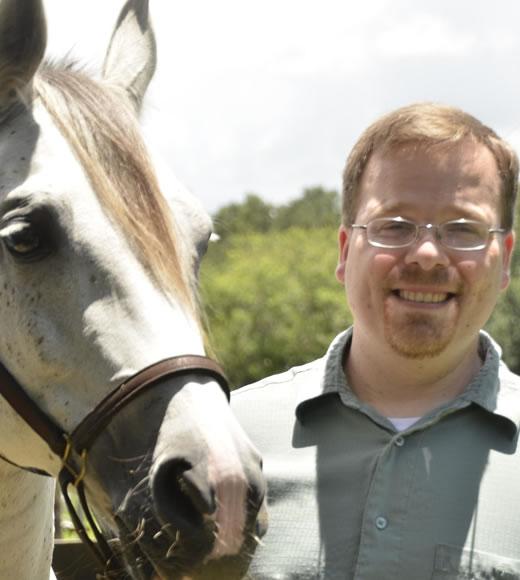
Position Title
Associate Professor
Education
- B.S., Michigan State University, 1999 (Zoology: Cellular & Developmental Biology)
- DVM., Michigan State University, 2004
- Ph.D., University of Kentucky, 2008 (Veterinary Science)
- Post-doctoral training, University of South Florida, 2008-2014 (Molecular Pharmacology & Physiology; Orthopaedics & Sports Medicine)
Research Interests
My primary research interests are based in the development, maturation, and repair of musculoskeletal tissues. Past efforts have been focused on articular cartilage and tendon, particularly on how phenotypes for cells like chondrocytes, bone marrow stromal cells, and tendon peritenon- and tendon proper-derived progenitor cells differ by niche, or surrounding environment. Additionally, because collagen assembly and organization are important to functionally sound musculoskeletal tissue, my research interests include the examination of how collagen fibrillogenesis might be manipulated to achieve optimal recovery of tissues with repair. The ultimate goal is to determine if alterations in niche components and organization and/or interacting cell physiology can lead to alterations in repair pathways or tissue engineering strategies to prevent and treat musculoskeletal injury. In order to reach this goal, I rely on functional genomics as well as expressional (mRNA and protein) analyses, morphometric analyses, and biomechanical assays.
I am interested in the physiology of usage and elite performance as well as pathophysiology from over-usage, acute and chronic injury for all musculoskeletal tissues on all species, as they might be related to use, environment, or genetics. Though past efforts have been primarily in horse and mouse, all animals are subject to musculoskeletal injury. Moreover, from performance species like dogs, horses, and us humans, to production species like cattle, swine, and poultry, painful musculoskeletal injuries and disorders are both costly and debilitating on so many levels.
Additional information about research
Graduate Groups
Courses Taught
- Animal Biochemistry and Metabolism (ABI 102)
- Introductory Horse Husbandry (ANS 15)
- Internships in Animal Science - informal (ANS 92 & ANS 192)
- Internships in Animal Science - formal (ANS 192)
- Special Study for Undergraduates (ANS 99 & ANS 199)
- Honors Contract (HNR 190X)
People
Current Graduate Students
- Monica Pechanec, MS Program, Animal Biology Graduate Group.
Selected Publications
Peer-reviewed research articles
Mienaltowski MJ, Huang L, Stromberg AJ, MacLeod JN. Differential gene expression associated with equine postnatal articular cartilage maturation. BMC Musculoskeletal Disorders 2008 Nov 5; 9 149. (Article Link)
Mienaltowski MJ, Huang L, Frisbie DD, McIlwraith CW, Bathke AC, Stromberg AJ, MacLeod JN. Transcriptional profiling differences for articular cartilage and repair tissue in equine joint surface lesions. BMC Medical Genomics 2009 Sep 14; 2 60. (Article Link)
Mienaltowski MJ, Huang L, Bathke AC, Stromberg AJ, MacLeod JN. Transcriptional comparisons between equine articular repair tissue, neonatal cartilage, cultured chondrocytes, and mesenchymal stromal cells. Briefings in Functional Genomics 2010 May; 9(3):238-50. (PubMed Abstract)
Mienaltowski MJ, Adams SM, Birk DE. Regional differences in stem cell/progenitor cell populations from the mouse Achilles tendon. Tissue Engineering Part A 2013 Jan; 19 (1-2): 199-210. (Article Link)
Dunkman AA, Buckley MR, Mienaltowski MJ, Adams SM, Thomas S, Satchell L, Kumar A, Pathmanathana L, Beason DP; Iozzo RV, Birk DE, Soslowsky LJ. Decorin expression is important for age-related changes in tendon structure and mechanical properties. Matrix Biology 2013 Jan; 32:3-13. (Article Link)
Dunkman AA, Buckley MR, Mienaltowski MJ, Adam S, Thomas SJ, Satchell L, Kumar A, Pathmanathan L, Beason DP, Iozzo RV, Birk DE, Soslowsky LJ. The tendon injury response is influenced by biglycan and decorin. Annals of Biomedical Engineering, 2014 Mar; 42(3):619-30. (PubMed Abstract)
Dunkman AA*, Buckley MR*, Mienaltowski MJ, Adams SM, Thomas SJ, Kumar A, Beason DP, Iozzo RV, Birk DE, Soslowsky LJ. The injury response of aged tendons in the absence of biglycan and decorin. Matrix Biology, 2014 April; 35:232-238. (Article Link)
Mienaltowski MJ, Adams SM, Birk DE. Tendon Proper- and Peritenon-Derived Progenitor Cells Have Unique Tenogenic Properties. Stem Cell Research & Therapy, 2014 July 8; 5(4):86. (Article Link)
Book chapters
Coleman SJ, Mienaltowski MJ, MacLeod JN. Ch.8: Functional Genomics in Equine Genomics, Ames, Iowa: Wiley-Blackwell, Inc., 2013, pp. 125-141. (ISBN: 978-0813815633). (Chapter link)
Mienaltowski MJ and Birk DE. Ch. 2: Structure, Physiology and Biochemistry of Collagens in: Halper J (ed): Progress in Heritable Soft Connective Tissue Disorders, Advances in Experimental Medicine and Biology, NY: Springer, 2014, pp. 5-29. (ISBN 978-94-007-7893-1). (PubMed Abstract)
Mienaltowski MJ and Birk DE. Ch. 13: Mouse Models in Tendon and Ligament Research in: Halper J (ed): Progress in Heritable Soft Connective Tissue Disorders, Advances in Experimental Medicine and Biology, NY: Springer, 2014, pp. 201-230. (ISBN 978-94-007-7893-1). (PubMed Abstract)
All peer-reviewed publications can be found here.
